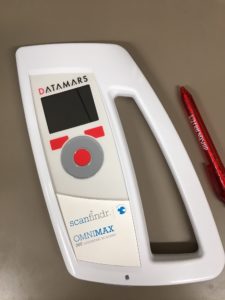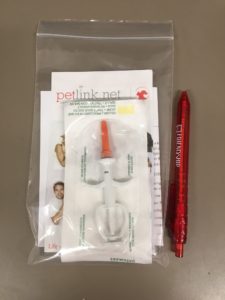You Asked: Can I use a microchip to locate my pet, like a lojack does for stolen vehicles?
Our primary care doctor, Dr. Kimberly Schultz, DVM, has the answer:
Microchips do not work like GPS systems.
Microchips are tiny radio frequency identifying devices (roughly the size of a grain of rice). A microchip is implanted under your pets skin and each chip carries a unique number. A scanning device can detect this number, which is then linked to your contact information on a pet recovery database. The procedure to place a microchip involves a quick and relatively painless injection usually in-between the shoulder blades of a pet.
Most shelters and animal clinics have microchip scanners, and it is routine procedure to scan stray or a seemingly lost cat or dog for a microchip in order to identify the owner. Once the pet is scanned and the microchip number is determined, the next step is to contact the microchip company and give them the microchip number. The company is then able to search their database for a match; therefore, connecting the lost pet with their owner. This is why it’s imperative for an owner to register their pet’s microchip on the company’s website!


The microchip should last for your pet’s lifetime, and unlike a collar or tags or attached device, can not be lost. You can change or update your contact information via the company’s website at any time.
However, with today’s technology if you would like to track your pet via GPS, there are several options: click here to read more. But beware, all of these options work as attached devices; meaning that they attach to your pets collar. Therefore, if your pet happens to get away from you, the device can be knocked loose off of the collar rendering the device useless.

Dr. Kimberly Schultz graduated from Cornell University’s College of Veterinary Medicine in 1997 after completing a bachelor’s degree in animal science. She practiced in Virginia for several years before joining Friendship in 2004. Dr. Schultz works in our Primary Care department.
* Featured image courtesy of Vet West Animal Hospitals.

